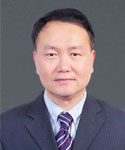 Battery Division Technology Award
Battery Division Technology Award
Exploring Stable Manganese-Based Oxides As Cathodes for Na-Ion Batteries
By Yong Yang
Yong Yang is Distinguished Professor of Chemistry at Xiamen University (XMU), China. In 1992, Yong completed his PhD in Physical Chemistry at XMU and a two-year split PhD study in the UK. After completing his degree, he started his academic career at the XMU State Key Lab of Physical Chemistry of Solid Surfaces. He was Academic Visitor at the University of Oxford in 1997-1998. Yong now leads a group of about 50 members working on the electrochemistry of battery materials. His main research interests are new electrode/electrolyte materials for Li/Na-ion batteries, developing in situ spectroscopic techniques such as solid state NMR, and synchrotron-based x-ray techniques, diagnosis, and life-predication methods for practical Li/Na-ion batteries. Yong’s industrial partners include ATL, Huawei, TDK, and GM. He serves as Editor for J Power Sources and board member of the International Battery Materials Association (IBA) and International Meeting on Lithium Batteries (IMLB). He received the Outstanding Young Investigator Award of the National Natural Science Foundation of China (NNSFC) (1999), IBA Technology Award (2014), and Excellent Contribution Award of The Chinese Electrochemical Society (2017). He authored the book Solid State Electrochemistry (Chemical Industry Press, China) in 2017 and published more than 300 papers in peer-reviewed journals. Over the last 30 years, he mentored more than 80 postdocs, PhD, and MS students.
 Battery Division Technology Award
Battery Division Technology Award
Integrating Materials Science, Electrochemistry and Engineering in Energy Storage Technologies
By Jie Xiao
Jie Xiao is Laboratory Fellow and Group Leader of Battery Materials & Systems at the Pacific Northwest National Laboratory (PNNL), US. She is also an affiliated Professor at the University of Washington (UW), US, and a UW-PNNL Distinguished Faculty Fellow in the Materials Sciences & Engineering Department at UW. Xiao obtained her PhD in Materials Chemistry from the State University of New York Binghamton, US. She leads research thrusts on the fundamental study of energy storage materials and systems, and their practical applications, spanning from micro-batteries for acoustic sensors to advanced battery technologies for vehicle electrification and grid energy storage. She published more than 100 peer-reviewed journal papers and two book chapters. Xiao has been named top 1% Clarivate Analytics Highly Cited Researcher since 2017. Xiao holds 17 US patents in the area of energy storage research with three patents licensed to industry companies. A Battelle Distinguished Inventor, she received the Federal Laboratory Consortium (FLC) Award, Young Researcher Award from the International Automotive Lithium Battery Association, Exceptional Contribution Award from the DOE Innovation Center for Battery500 Consortium, Ronald L. Brodzinski Early Career Exceptional Achievement Award, R&D 100 Award, and ACS Zappert Award.
 Battery Division Research Award
Battery Division Research Award
Electrolyte Oxidation Mechanisms in Lithium-Ion Batteries and Related Follow Up Reactions
By Hubert Gasteiger
Hubert Gasteiger received his PhD in Chemical Engineering from the University of California, Berkeley (1993), US, working with Elton Cairns, Phil Ross, and Nenad Marković. He completed postdoctoral studies at Lawrence Berkeley National Laboratory with Phil Ross and Nenad Marković (1994–1995), and Universität Ulm, Germany, with Jürgen Behm (1996–1998). Gasteiger joined the GM/Opel fuel cell program (Honeoye Falls, US) as Technical Manager (1999–2007), leading the development of catalysts and membrane electrode assemblies. In 2009, he was Visiting Professor at the Massachusetts Institute of Technology with Professor Yang Shao-Horn. Appointed Chair of Technical Electrochemistry in 2010 at the Technische Universität München, Germany, his group develops materials, electrode designs, and diagnostics for PEM fuel cells/electrolyzers and lithium ion batteries. He published 202 refereed articles (H-index 74), 15 book chapters, 38 patent applications/patents, and served as Editor-In-Chief for Wiley’s Handbook of Fuel Cells (2003 and 2009).
In 2004, Gasteiger received the International Society of Electrochemistry Klaus-Jürgen Vetter Award, and was promoted to Technical Fellow at General Motors. Named Fellow of The Electrochemical Society in 2011, he received the ECS Grove Medal (2012), Physical and Analytical Electrochemistry Division David C. Grahame Award (2015), and the Energy Technology Division Research Award (2017). Gasteiger delivered the 2018 Jacobus van’t Hoff Lecture of the Process Technology Institute at Delft University of Technology, Netherlands. Since 2017, he has served as member of the European Union’s Scientific Committee Fuel Cell and Hydrogen Joint Undertaking.
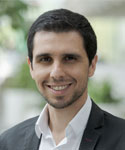 Battery Division Postdoctoral Associate Research Award Sponsored by MTI Corporation and the Jiang Family Foundation
Battery Division Postdoctoral Associate Research Award Sponsored by MTI Corporation and the Jiang Family Foundation
Li Plating During Fast Charge: Detection and Prevention
By Marco-Tulio F. Rodrigues
Marco-Tulio F. Rodrigues is a postdoctoral researcher in the Chemical Sciences and Engineering Division of Argonne National Laboratory, US, where, since the summer of 2018, he has worked under the mentorship of Dr. Daniel Abraham. His research focuses on the development of methods to improve the mechanistic understanding of how Li-ion batteries operate, applying fundamental science to problems of practical relevance. His current interests extend over multiple Li-ion battery topical areas, including the development of fast-charging protocols, characterization of silicon anodes, and advancing the understanding of high-energy oxide cathodes. Marco received his PhD in Materials Science and Nanoengineering in 2018 from Rice University, US, where he conducted research on high-temperature-resilient Li-ion batteries under the guidance of Prof. P. M. Ajayan. His contributions to battery science were recognized with Argonne’s Outstanding Postdoctoral Performance Award (2019), the Travel Award for Young Electrochemists (International Society of Electrochemistry, 2019), and Hershel M. Rich Invention Award (Rice Engineering Alumni Association, 2018). Rodrigues mentored several undergraduate and graduate students, and authored over 39 scientific articles, many of them featured in The Electrochemical Society’s journals.
 Battery Division Postdoctoral Associate Research Award Sponsored by MTI Corporation and the Jiang Family Foundation
Battery Division Postdoctoral Associate Research Award Sponsored by MTI Corporation and the Jiang Family Foundation
Extending Battery Life – Studies within the Faraday Institution on NMC811/Graphite Full Cells
By David Hall
David S. Hall is a Research Associate in the Department of Chemistry at Cambridge University and a Postdoctoral Research Associate of Hughes Hall, Cambridge, UK. He received a BS (2010) with Honours Specialization in Chemistry and Minor in Materials Science from Western University (Canada) and a PhD (2014) in Chemistry from the University of Ottawa (Canada). His doctoral research was performed as a Visiting Scientist at the National Research Council Canada. Hall received an NSERC-CREATE Fellowship for Postdoctoral Research at Dalhousie University, Canada (2014-2016), where he researched electrolyte additives for lithium-ion batteries. He then joined the Nuclear Waste Management Organization in Toronto, Canada (2016-2017). As project manager for a portfolio of academic, government, and industrial corrosion research across Canada, Hall regularly collaborated with several international partners. He was then a Postdoctoral Research Associate at Dalhousie University (2017-2019), studying characterization methods, electrolytes for fast charging, and additive synthesis for lithium ion batteries. Hall moved to Cambridge in 2019, where he is currently Joint Project Lead for the Faraday Institution Degradation Fast-start Project.
 Battery Division Student Research Award Sponsored by Mercedes-Benz Research & Development
Battery Division Student Research Award Sponsored by Mercedes-Benz Research & Development
Investigating Anomalous Conductivity in Low Permittivity Electrolytes for Multivalent Battery Applications
By Julian Self
Julian Self is a PhD candidate at the University of California Berkeley, US, working with Professor Kristin Persson on electrochemical research. He completed his MS at Dalhousie University, Canada, under the supervision of Dr. Jeff Dahn. He studied in situ gas formation in Li-ion pouch cells during cycling, as well as electrolyte decomposition and electrode-interphase formation.
Within the scope of his PhD thesis, Julian focuses on computation, modelling and simulation work in collaboration with experimental teams. He works to understand bulk, transport, and interfacial properties of state of the art and “next generation” electrolytes, both Li+ based as well as multivalent, and how these directly tie into battery performance. One of the current research topics is interionic interactions in multivalent electrolytes. The charting of salt interactions and speciation in such electrolytes is part of a larger effort to understand bulk properties as well as charge delivery and interphase formation in multivalent batteries. Systems of interest include magnesium and calcium salts in ether-based solvents. Julian uses computational and theoretical tools in conjunction with collaborators using experimental techniques such as dielectric relaxation spectroscopy. As an example, Julian uncovered a universal redissociation mechanism, which was found to explain observed anomalous transport behavior in multivalent low-permittivity solvent systems.
 Battery Division Student Research Award Sponsored by Mercedes-Benz Research & Development
Battery Division Student Research Award Sponsored by Mercedes-Benz Research & Development
Sustainable High-Performance Lithium-Ion Batteries: Aqueous Processing of Cobalt-Free High-Energy Cathodes
By Matthias Künzel
Matthias Künzel obtained his BSc (2014) and MSc (2016) in Molecular Nano Science at the Friedrich-Alexander University in Erlangen, Germany. During his graduate studies, he visited the University of Wollongong in Australia for a research stay funded through the ISAP program of the German Academic Exchange Service, where he investigated impedance-based strain sensors made from conducting tough hydrogels. Returning to Germany to complete his master’s thesis, he studied at the Robert Bosch Research Campus in Renningen, developing electrochemical pre-lithiation of silicon anodes for lithium ion batteries.
Künzel continued battery research in his PhD in Physical Chemistry at the Helmholtz-Institute Ulm and Karlsruhe Institute of Technology in Germany. His work under Prof. Stefano Passerini explores sustainable high-performance lithium ion batteries with particular focus on cobalt-free positive electrode materials and their aqueous processing.
As an early career researcher, Künzel demonstrated the feasibility of aqueous electrode processing of water-sensitive high-voltage cathode materials and introduced concepts and strategies for their successful implementation. A main outcome is the complementary protection of positive active material with simultaneous crosslinking of the binder through selected processing additives leading to significantly enhanced performance of sustainable 5V lithium-ion batteries.
Künzel’s work has been published in ChemSusChem, ACS Applied Energy Materials and Materials Today. He contributed to 14 peer-reviewed publications and co-authored one European patent.
 Corrosion Division H. H. Uhlig Award
Corrosion Division H. H. Uhlig Award
Corrosion of (Nominally and Notionally) Reactive Engineering Alloys
By Nick Birbilis
Nick Birbilis is the Deputy Dean of the College of Engineering and Computer Science at the Australian National University. His research seeks an understanding between corrosion and microstructure, and as a consequence, characterization across all length scales remains a focus. Birbilis’ research focused across many materials classes, with an emphasis on durability and materials design. This includes light alloys, additively manufactured alloys, and compositionally complex alloys. Birbilis is a Fellow of the National Association of Corrosion Engineers, Fellow of The Electrochemical Society, and Fellow of the International Society of Electrochemistry. Birbilis earned his PhD from Monash University, Australia, and was a postdoctoral fellow at The Ohio State University, US. He commenced his academic career at Monash University as the inaugural Woodside Innovation Chair, and also served as the Head of Department (Materials Science and Engineering) from 2013 to 2018. Birbilis authored over 350 publications and serves as a long-standing Editor for Electrochimica Acta; he is also Editor-in-Chief of npj Materials Degradation.
 Corrosion Division Morris Cohen Graduate Student Award
Corrosion Division Morris Cohen Graduate Student Award
Chao (Gilbert) Liu is currently R&D Researcher/Electrochemist with Royal Dutch Shell at their US technology center. He obtained his PhD from the Materials Science and Engineering Department at the University of Virginia, US, in December 2018. His PhD work seeks a fundamental understanding of localized corrosion degradation of the airframe structure introduced by galvanic connection of dissimilar materials during atmospheric exposure, via a combined modeling and experimental approach. The outcome of this research contributed to the fundamental understanding of the field of atmospheric galvanically-induced localized corrosion, and provided corrosion mitigation insights to the protection of metal/alloy-based infrastructures during atmosphere exposure. His study, supported by the Office of Naval Research, was part of a collaboration with academic advisors Prof. Rob Kelly, Prof. John Scully, and Prof. Jimmy Burns.
Chao received his BS in applied chemistry at Nanchang University, China. He completed his MS in chemical engineering at the University of Florida, US, in 2012, under the supervision of Prof. Mark Orazem who introduced him to the corrosion world. Chao is also a columnist for the Interface Tech Highlights Section.
 Electrodeposition Division Research Award
Electrodeposition Division Research Award
Superconformal Deposition: Where We Are and Where We Might Go
By Daniel Josell
Daniel Josell majored in Physics and Mechanical Engineering as an undergraduate at Harvard College, US, and received his doctoral degree in Engineering Sciences, specializing in Materials Science, from Harvard University. On the staff of the National Institute of Standards and Technology (NIST) for 28 years, he has held positions including Leader of the Thin Film and Nanostructure Processing Group, and Deputy Chief of the Metallurgy Division. For research on superconformal deposition processes for interconnect fabrication, Josell co-received, with Dr. Thomas Moffat, the Samuel Wesley Stratton Award—NIST’s highest award for scientific achievement—and the US Department of Commerce’s highest Gold Medal Award. Josell’s research also explored the mechanical and thermal transport properties of multilayered materials, the thermodynamics of interfaces, the stability of nanoscale materials and structures, and the processing and properties of three-dimensionally structured photovoltaic devices. He is author or co-author of more than 140 technical publications which have been cited some 6,000 times.
 Electrodeposition Division Early Career Investigator Award
Electrodeposition Division Early Career Investigator Award
Metal Patterning by Electrodeposition: Local Bipolar Electrochemistry and Additive-Derived Electrode Bifurcation
By Trevor Braun
Trevor Braun is Research Scientist at the National Institute of Standards and Technology (NIST). He received his BS in Chemical Engineering from the Colorado School of Mines, US, in 2011 before joining Dr. Daniel Schwartz’s lab at the University of Washington, US, where he earned his PhD in 2016. His doctoral research involved integrating bipolar electrochemistry with microjet electrodes to enable localized electrodeposition and patterning without requiring direct electrical connections to the substrate. This work resulted in a US patent and six first-author publications, one of which was selected for the ECS Norman Hackerman Award.
At NIST, first as a National Research Council Postdoctoral Fellow advised by Dr. Thomas Moffat, and now as Research Scientist, Braun combines computational and experimental techniques to understand and characterize the S-NDR (s-shaped negative differential resistance) phenomenon crucial to bottom-up deposition in high-aspect ratio features used in electronics manufacturing. In this work, electroanalytical measurements inform theoretical models that describe the influence of surface adsorbates and mass transport on electrochemical kinetics. The theory is validated by comparison of experimental through-silicon via and through-hole filling to simulations capturing the electrode shape change, and has resulted in four first-author publications. Braun’s broader research interests include modeling energy systems, scanning probe electrochemical methods, and combinatorial evaluation of material properties.
 Energy Technology Division Supramaniam Srinivasan Young Investigator Award
Energy Technology Division Supramaniam Srinivasan Young Investigator Award
Using Mechanistic Understanding of Electrocatalytic CO2 and CO Reduction to Guide Catalyst Discovery
By Christopher Hahn
Christopher Hahn completed his PhD in Chemistry at the University of California Berkeley, US, in 2012, where he studied bandgap engineering of 1-dimensional nitride and oxynitride materials for solar water splitting. He then conducted postdoctoral research on catalyst discovery for electrochemical CO2 reduction at Stanford University, US, in the SUNCAT Center for Interface Science and Catalysis. He began his current position as Associate Staff Scientist at SLAC National Accelerator Laboratory in 2015, where he conducts research at the intersection between the fields of heterogeneous catalysis and organic electrosynthesis.
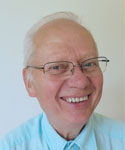 High Temperature Materials Division Outstanding Achievement Award
High Temperature Materials Division Outstanding Achievement Award
Electrochemical Engineering of Cells for Conversion of Renewable Energy
By Mogens Mogensen
Mogens Mogensen is Professor Emeritus at the Department of Energy Conversion and Storage, Technical University of Denmark (DTU). He obtained his MS in Chemical Engineering from DTU in 1973 and PhD in Corrosion and Metallurgy from DTU in 1976. During Mogensen’s45 years in electrochemistry, he has been active in the science of solid oxide fuel cells and electrolyser cells for the past 31 years; high temperature and pressurized (200 – 250 °C, 20 – 40 bar) alkaline electrolyser cells for 11 years; and polymer electrolyte membrane electrolysis for five years. His early career work also involved corrosion, Li-batteries, and nuclear materials. He supervised more than 40 PhD students.
Mogensen served as a member of the Executive Committee of the ECS High Temperature Materials Division for 20 years, associated editor of SSI for a decade, and, for four years, was involved in the Independent Research Fund Denmark – Technology and Production Sciences. A member of numerous international conference boards, Mogensen was Head of Program for two years, leader of the Strategic Electrochemical Research Center for six years, coordinator of EU projects, and manager of many Danish and international R&D projects.
Mogensen has 291 publications with an H-index of 66 and more than 17,000 citations. Two of these publications have been cited over 1000 times; 45 publications over 100 times; and 189 publication over 10 times (Web of Science, July 2020). He has 23 published patents/applications, nine book chapters, and 170 other research publications.
In 2015, Mogensen was named a Fellow of The Electrochemical Society. In 2012 he received the Science of Hydrogen & Energy Award at the 6th Hydrogen & Energy Symposium, Switzerland, and was elected a member of the Danish Natural Science Academy. He received the 2008 Christian Friedrich Schönbein Gold Medal of Honour at the 8th European Fuel Cell Forum, Lucerne, Switzerland.
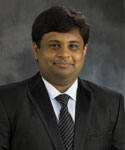 Industrial Electrochemistry and Electrochemical Engineering Division Student Achievement Award
Industrial Electrochemistry and Electrochemical Engineering Division Student Achievement Award
From the 237th ECS Meeting
System-Level Approaches for Intensifying the CO2 Electrolysis Process
By Saket Bhargava
Saket Bhargava completed his Bachelor of Engineering with Honors in Chemical Engineering from the Birla Institute of Technology & Science–Pilani, India, in May 2015. He then worked as a process technologist for propylene oxide derivatives for two years at the Royal Dutch Shell Technology Center in India. Saket began his graduate studies at the University of Illinois at Urbana-Champaign, US, in 2017. He joined Professor Paul Kenis’ research group where he works on using flow electrolyzers to develop system-level process intensification approaches, and studies the effects of intensified process conditions on the activity, selectivity, and energy efficiency for CO2 electroreduction to value-added chemicals.
 Industrial Electrochemistry and Electrochemical Engineering Division H. H. Dow Memorial Student Achievement Award
Industrial Electrochemistry and Electrochemical Engineering Division H. H. Dow Memorial Student Achievement Award
From the 237th ECS Meeting
Anion Exchange and Bipolar Membranes for Electrochemical Energy Conversion and Storage
By Zhongyang Wang
Zhongyang Wang earned his PhD in 2019 from Washington University’s Energy, Environmental and Chemical Engineering Department (US), under the supervision of Prof. Vijay Ramani. His research focuses on understanding and improving the alkaline stability of anion exchange membranes with applications in flow batteries, alkaline membrane fuel cells, and direct borohydride fuel cells. He led the development of direct borohydride fuel cells by devising a bipolar junction with an anion-exchange-membrane-containing electrode placed adjacent to a cation exchange membrane separator. With this architecture he performed the respective electrochemical reactions at their ideal (significantly disparate) pH. He demonstrated (through fundamental electrochemical and morphological studies) that the bipolar junction was capable of maintaining a very sharp pH gradient of about 0.82 pH unit/nm. This work, published in the peer-reviewed journal Nature Energy, had significant impact with multiple offers of collaboration from groups worldwide.
Wang’s postdoctoral research at the University of Chicago’s Pritzker School of Molecular Engineering, US, is supervised by Professor Paul Nealey. Wang’s work focuses on phase behavior and electronic transport in self-assembling conjugated copolymers.
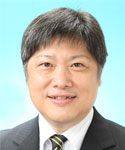 Luminescence and Display Materials Division Centennial Outstanding Achievement Award
Luminescence and Display Materials Division Centennial Outstanding Achievement Award
Investigation of Luminescent Materials based on First-principles Calculations of Multiplet States
By Kazuyoshi Ogasawara
Kazuyoshi Ogasawara is a professor in the Department of Chemistry at Kwansei Gakuin University, Japan. He received his BS, MS, and PhD in Physics from Kyoto University, Japan, in 1991, 1993, and 1996, respectively. After graduating, Ogasawara joined the Department of Materials Science and Engineering at Kyoto University as Research Associate. In 2002, he moved to the Department of Chemistry at Kwansei Gakuin University as Lecturer, then was promoted to Associate Professor in 2004, and Professor in 2010.
Ogasawara’s research focuses on the theoretical investigation of luminescent materials activated with transition-metal and rare-earth ions. As part of his research, Ogasawara developed a first-principles relativistic configuration-interaction (CI) calculation program, known as the relativistic discrete-variational multi-electron (DVME) program, in which both the many-electron effect and the relativistic effect can be considered simultaneously. This program enabled the reproduction and analyzing of multiplet structures and optical spectra of rare-earth ions in crystals without any empirical parameters. He analyzed multiplet states of a variety of luminescent materials based on the explicitly obtained many-electron wave functions and clarified fundamental electronic states beyond the one-electron model. Utilizing the predictive capability of his program, he also performed systematic first-principles calculations and created various energy-structure maps, providing valuable information for the theoretical design of novel luminescent materials. Ogasawara published over 100 peer-reviewed scientific papers.
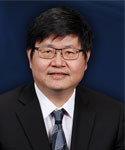 Physical and Analytical Electrochemistry Division Max Bredig Award In Molten Salt and Ionic Liquid Chemistry
Physical and Analytical Electrochemistry Division Max Bredig Award In Molten Salt and Ionic Liquid Chemistry
The Ionic Melting Pot: My Research in Molten Salts and Ionic Liquids
By Sheng Dai
Sheng Dai obtained his BS (1984) and MS (1986) in Chemistry at Zhejiang University, Hangzhou, China, and his PhD (1990) in Chemistry at the University of Tennessee, Knoxville, US. He is currently a Group Leader in the Chemical Sciences Division of the Oak Ridge National Laboratory (ORNL), Professor of Chemistry at the University of Tennessee, Knoxville, and serves as a Director for the Energy Frontier Research Center for Fluid Interface Reactions, Structures and Transport. He was honored with the UT-Battelle Corporate Fellow in 2011, the highest designation a researcher can receive at ORNL. Dai’s current research interests include ionic liquids, porous materials, and their applications for separation sciences and energy storage as well as catalysis by nanomaterials. As a result of his research, he received various awards including the 2019 ACS Award in Separation Science and Technology, 2018 International Mesostructured Materials Association Award, 2016 Battelle Distinguished Inventor Award, and six R&D100 Awards (2011, 2012, two in 2014, 2015, and 2016). He is also a Fellow of the Material Research Society and Fellow of the American Association for the Advancement of Science.
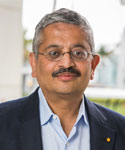 Sensor Division Outstanding Achievement Award
Sensor Division Outstanding Achievement Award
Towards Biosensor Enabled Smart Dressings for Management of Chronic Wounds: Advances and Perspectives
By Shekhar Bhansali
Shekhar Bhansali is Alcatel-Lucent Professor and Chair of Electrical and Computer Engineering at Florida International University, US. Bhansali received his PhD in Electrical Engineering from RMIT University in Australia (1997). A prolific researcher, he published over 150 journals and 163 conference papers, and holds 36 U.S patents. As a mentor, Bhansali advised over 65 PhD and MA students, and more than 130 undergraduate/high school students. As director of multiple training programs, he mentored over 200 doctoral students at the intersection of disciplines. Bhansali received numerous awards including the William R. Jones Outstanding Mentor Award, Alfred P. Sloan Foundation Mentor of the Year Award, and NSF CAREER Award.
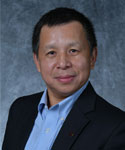 Sensor Division Outstanding Achievement Award
Sensor Division Outstanding Achievement Award
Paper-Based Lateral Flow Strips As Point-of-Care Testing Tools for Detection of Biomarkers and Viruses
By Nianqiang (Nick) Wu
Nianqiang (Nick) Wu received his PhD in Materials Science & Engineering from Zhejiang University, China, in 1997. He became Assistant Professor at West Virginia University (WVU), US, in 2005, and was promoted to Full Professor in 2014. As of January 2020, he is an Armstrong-Siadat Endowed Professor in Materials Science in the Department of Chemical Engineering at the University of Massachusetts Amherst, US.
Wu was named a Fellow of The Electrochemical Society, and Royal Society of Chemistry. He received awards such as Highly Cited Researcher (Clarivate Analytics, Thomson Reuters), Benedum Distinguished Scholar Award, Alice Hamilton Award for Excellence in Occupational Safety & Health, and George B. Berry Chair of Engineering (WVU). He is a past Chair of the ECS Sensor Division.
Wu received the 2020 ECS Sensor Division Outstanding Achievement Award for advancing the fundamental understanding of sensing principles and transforming the fundamental knowledge of practical sensor devices. He made seminal contributions to the science and technology of sensors for detection of environmental pollutants and human biomarkers.
 Europe Section Alessandro Volta Medal
Europe Section Alessandro Volta Medal
Electrolytes and Metallic Anodes: About an Old Argument That Marks the Fundamental Understanding of Modern Metal Anodes in Advanced Battery Systems
By Martin Winter
Martin Winter has researched in the field of electrochemical energy storage and conversion for 30 years. His focus is on the development of new materials, components, and cell design for lithium ion, lithium-metal batteries, and alternative battery systems. Winter currently holds a Professorship for Materials Science, Energy, and Electrochemistry at the Institute of Physical Chemistry at the University of Münster, Germany.
Winter is Founder and Scientific Director of the MEET Battery Research Center at Münster University, and the Helmholtz-Institute Münster Ionics in Energy Storage, a division of Forschungszentrum Jülich. He is also a member of the Electromobility Expert Council of the North Rhine-Westphalian State Government, and spokesman for German Battery Research (Federal Ministry of Education and Research).
Among more than 50 awards and recognitions, he holds the ECS Carl Wagner Memorial Award, and the Royal Society of Chemistry Faraday Medal. He received research and technology awards from ECS and the International Battery Materials Association (IBA), and the Federal Cross of Merit 1st Class granted by the President of Germany. He is a Fellow of The Electrochemistry Society and the International Society of Electrochemistry, and an elected member of the National Academy of Technical Sciences. Winter is Honorary Professor at National Taiwan University of Science and Technology (Taiwan Tech) in Taipei, and National Cheng Kung University in Tainan (Taiwan).





